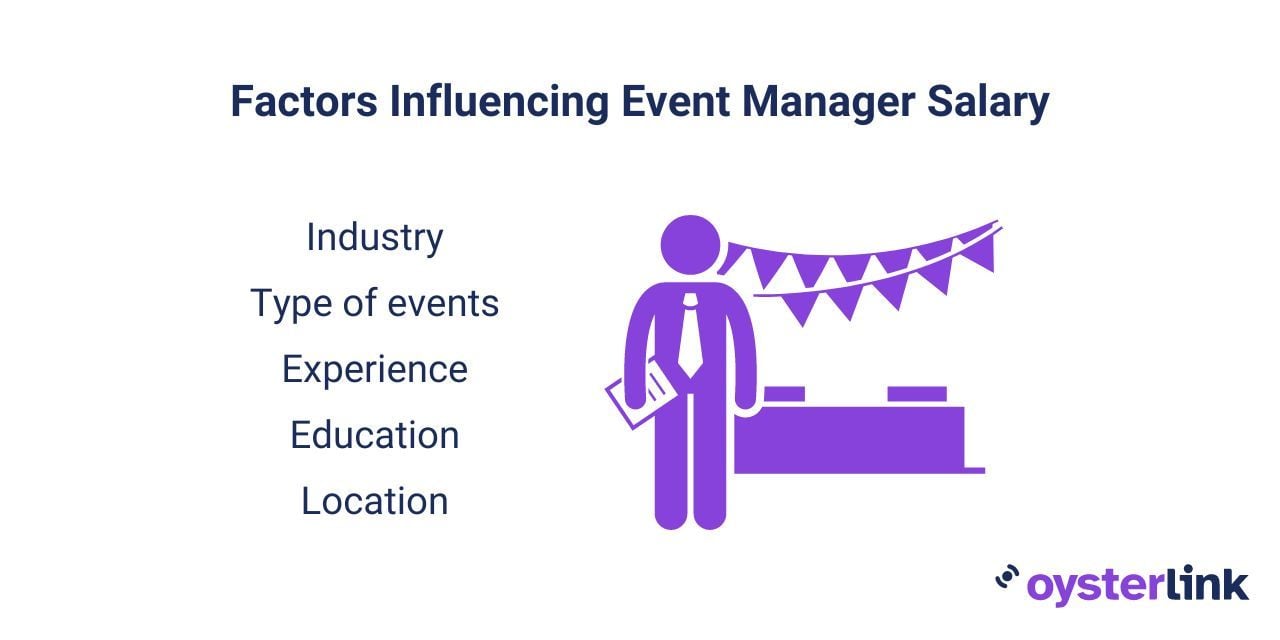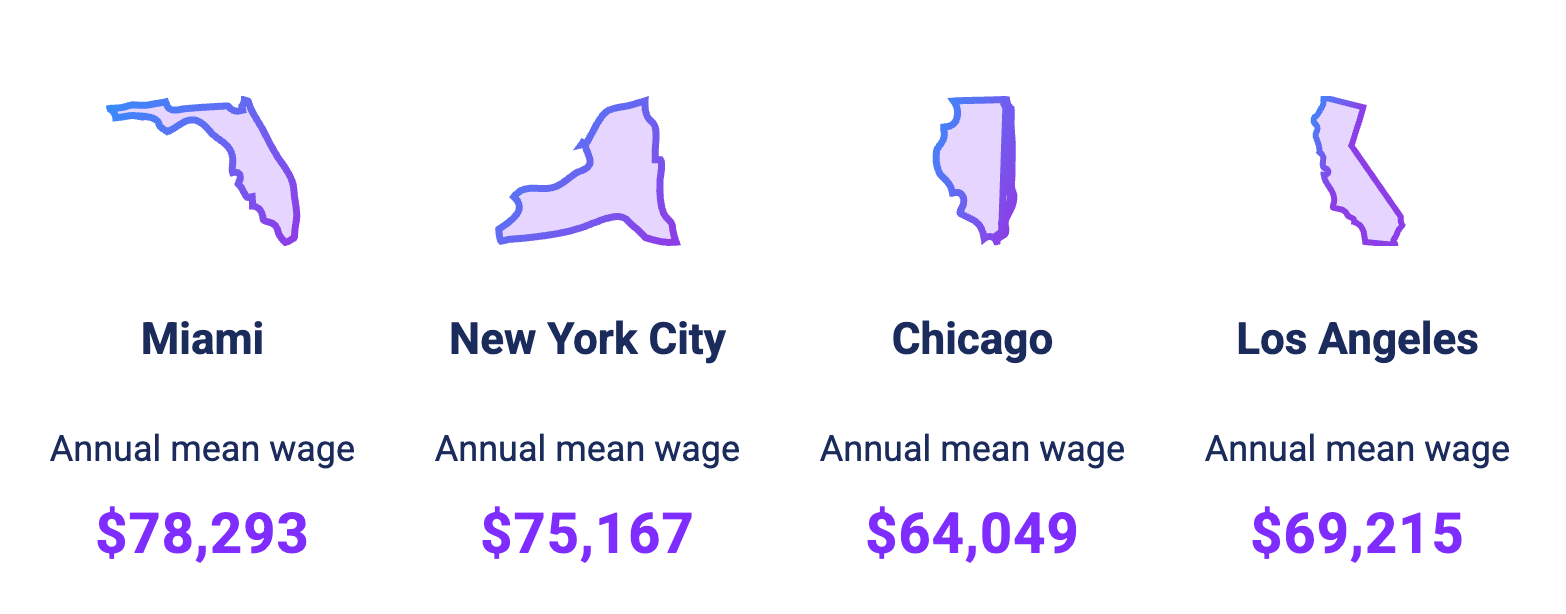Event Manager Salary in 2026:
A Comprehensive Guide
The average base salary for an Event Manager in the U.S. is approximately $78,729 a year.
For a comprehensive look into Event Manager earnings, continue reading — this guide covers everything you need to know.
Before diving in, try our comparison tool below. It helps you see how your current or target Event Manager salary measures up against salaries in major U.S. cities.
How Much Does an Event Manager Earn Monthly?
The average monthly salary for an Event Manager is $6,080.
How Much Does an Event Manager Earn per Week?
Event Managers working in the United States earn an average weekly salary of $1,520.
What Is the Highest Salary an Experienced Event Manager Can Earn?
The highest salaries for experienced Event Managers can surpass $120,000 to $150,000 per year, particularly in high-demand industries and major metropolitan areas.
- Luxury Event Management (Weddings, Galas): $110,000 - $140,000 annually
- Corporate Events (Tech Conferences, Trade Shows): $100,000 - $130,000 annually
- Entertainment and Sports (Concerts, Festivals): $120,000+ for large-scale or globally recognized events
- Event Directors/Heads of Events (Executive-Level): $150,000 - $200,000
Factors Affecting an Event Manager’s Salary
There are several factors that can influence the Event Manager salary.
Some of the main ones include:
Industry
Event Manager role, just like the role of an Event Planner and the role of an Event Coordinator, work across a number of industries.
In 2023, the top industries with the highest median wages for Event Managers were:
- Religious, grantmaking, civic, professional, and similar organizations
- Administrative and support services
- Accommodation and food services
- Arts, entertainment, and recreation
Type of Events
Event Managers works across different industries, but they also organize and manage different types of events.
The type of event and its scale can also greatly influence how much an Event Manager earns.
You can explore some of the common types of events organized by Event Managers, categorized into:
- Corporate events: Conferences, trade shows and seminars
- Company meetings and off-sites: Team buildings, company parties and product launches
- Non-corporate events: Weddings, birthday parties and festivals
Experience
The amount of experience an Event Manager has and the strength of their portfolio can greatly influence how much they earn.
College education and certifications
While there are no specific education requirements for Event Managers, individuals who hold a college degree can command higher salaries than those without formal education.
Some of the formal, four-year degrees Event Managers can benefit from include:
- Business
- Marketing
- Communication
- Hospitality management
Aside from formal education, Event Managers can also explore certifications and shorter education which could demonstrate their expertise in planning and organizing an event.
Some of the courses to consider include those from:
- Events Industry Council (EIC)
- National Association for Catering and Events (NACE)
- International Association of Exhibitions and Events (IAEE)
Location
Event Managers, like most positions, earn different salaries in different states and cities.
Cities and states with booming event industries have a higher need for Event Managers, resulting in higher salaries for Event Managers and similar occupations.
Keep reading to learn more about Event Manager salaries in top-paying cities and states.

Top-Paying States for Event Managers
You can explore the map below to see how Event Managers salary varies across different U.S. states.
[Calculated using Indeed, Salary.com, ZipRecruiter and Talent.com data]
This map is interactive. Hover your mouse over different parts of the map to see detailed data.
States that offer the highest Event Manager salaries are California ($69,517), New York ($67,042) and Washington ($66,009).
Event Managers working in Alabama ($44,335), South Dakota ($45,705) and Arkansas ($46,453) earn lower salaries than their counterparts working in different states.
High-Paying Cities for Event Managers
Aside from state to state, Event Manager's salary also varies from city to city.
See how much Event Managers earn in major U.S. cities: Los Angeles, Chicago, Miami and New York City.

[Calculated using Indeed, Salary.com, ZipRecruiter and Talent.com data]
How To Estimate Your Take-Home Pay as an Event Manager
If you're an Event Manager in the U.S., use our Paycheck Calculator to quickly calculate your take-home pay after taxes and deductions based on your state's regulations. Follow these simple steps:
- Input your gross salary.
- Select how often you're paid (annually, monthly, biweekly, weekly, daily or hourly).
- Choose your state of employment.
- Hit the "Calculate Tax" button to see your results.
How Much Do Similar Careers to an Event Manager Get Paid?
Event Managers typically earn more than Event Coordinators and Event Planners due to the broader scope of responsibilities and leadership roles they hold.
- Event Manager:
- Average Salary (U.S.): $78,729 per year
- Role: Oversees entire event operations, manages budgets, coordinates with vendors and leads teams. They are responsible for the overall success of the event and handle strategic planning.
- Event Planner:
- Average Salary: $62,280 per year
- Role: Focuses on the logistics and design aspects, handling tasks like venue selection, scheduling and décor. Planners typically report to the Event Manager.
- Event Coordinator:
- Average Salary: $54,362 per year
- Role: Entry-level or mid-level position assisting with event execution, scheduling and vendor communication. Coordinators manage day-to-day tasks but don’t handle high-level planning.
Key Differences:
Industries like entertainment, tech, and corporate sectors often pay Event Managers significantly more, with salaries exceeding $90,000 depending on experience.
Event Managers often supervise Planners and Coordinators, taking on higher-stakes decisions.
Larger, more complex events (corporate conferences, festivals) typically require Event Managers, while smaller or local events may only need a Planner or Coordinator.